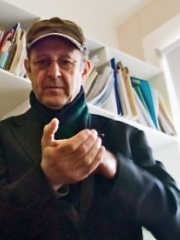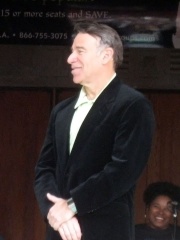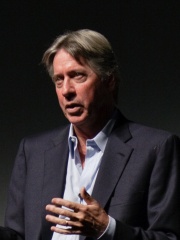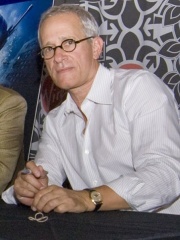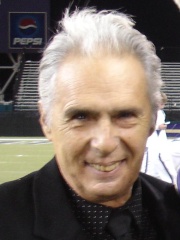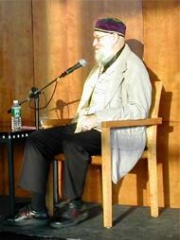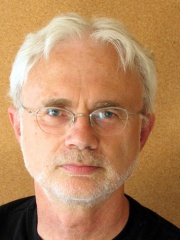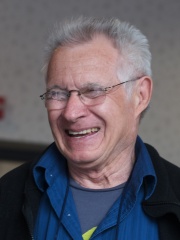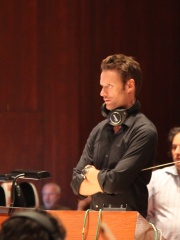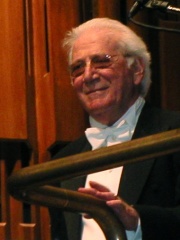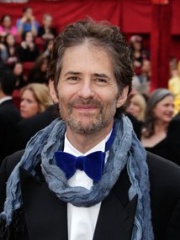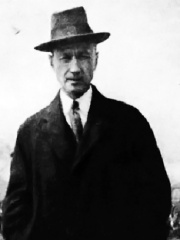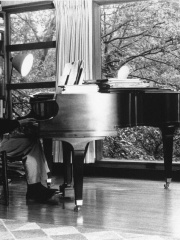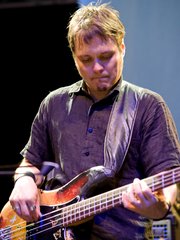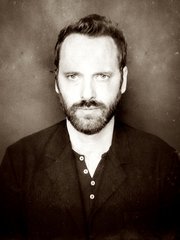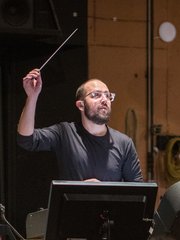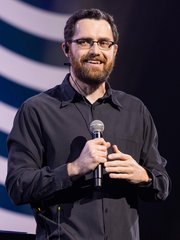
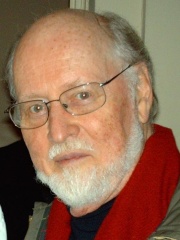
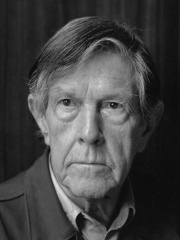
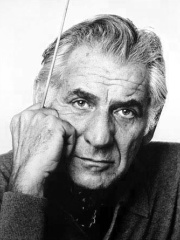


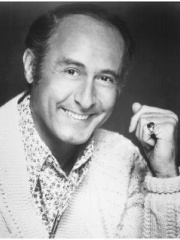
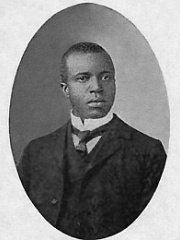
The Most Famous
COMPOSERS from United States
This page contains a list of the greatest American Composers. The pantheon dataset contains 1,451 Composers, 155 of which were born in United States. This makes United States the birth place of the 4th most number of Composers behind Italy, and France.
Top 10
The following people are considered by Pantheon to be the top 10 most legendary American Composers of all time. This list of famous American Composers is sorted by HPI (Historical Popularity Index), a metric that aggregates information on a biography's online popularity. Visit the rankings page to view the entire list of American Composers.

1. George Gershwin (1898 - 1937)
With an HPI of 77.09, George Gershwin is the most famous American Composer. His biography has been translated into 76 different languages on wikipedia.
George Gershwin (; born Jacob Gershwine; September 26, 1898 – July 11, 1937) was an American composer and pianist whose compositions spanned jazz, popular and classical music. Among his best-known works are the songs "Swanee" (1919) and "Fascinating Rhythm" (1924), the orchestral compositions Rhapsody in Blue (1924) and An American in Paris (1928), the jazz standards "Embraceable You" (1928) and "I Got Rhythm" (1930) and the opera Porgy and Bess (1935), which included the hit "Summertime". His Of Thee I Sing (1931) was the first musical to win the Pulitzer Prize for Drama. Gershwin studied piano under Charles Hambitzer and composition with Rubin Goldmark, Henry Cowell, and Joseph Brody. He began his career as a song plugger but soon started composing Broadway theater works with his brother Ira Gershwin and with Buddy DeSylva. He moved to Paris, intending to study with Nadia Boulanger, but she refused him, afraid that rigorous classical study would ruin his jazz-influenced style; Maurice Ravel voiced similar objections when Gershwin inquired about studying with him. He subsequently composed An American in Paris, returned to New York City and wrote Porgy and Bess with Ira and DuBose Heyward. Initially a commercial failure, it came to be considered one of the most important American operas of the 20th century and an American cultural classic. Gershwin moved to Hollywood and composed several film scores. He died in 1937, only 38 years old, of a brain tumor. His compositions have been adapted for use in film and television, with many becoming jazz standards.

2. John Williams (b. 1932)
With an HPI of 75.77, John Williams is the 2nd most famous American Composer. His biography has been translated into 72 different languages.
John Towner Williams (born February 8, 1932) is an American composer and conductor. Over his seven-decade career, he has composed many of the best known scores in film history. His compositional style blends romanticism, impressionism, and atonal music with complex orchestration. Best known for his collaborations with George Lucas and Steven Spielberg, he has received numerous accolades, including 26 Grammy Awards, five Academy Awards, seven BAFTA Awards, three Emmy Awards, and four Golden Globe Awards. With a total of 54 Academy Award nominations, he is the second-most nominated person in the award's history, after Walt Disney. He is also the oldest Academy Award nominee in any category, receiving a nomination at 91 years old. Williams's early work as a film composer includes None but the Brave (1965), Valley of the Dolls (1967), Goodbye, Mr. Chips (1969), Images and The Cowboys (both 1972), The Long Goodbye (1973) and The Towering Inferno (1974). He has collaborated with Spielberg since The Sugarland Express (1974), composing music for all but five of his feature films. He received five Academy Awards for Best Score/Best Score Adaptation for Fiddler on the Roof (1971); score adaptation of the original music by Jerry Bock), Jaws (1975), Star Wars (1977), E.T. the Extra-Terrestrial (1982) and Schindler's List (1993). Other memorable collaborations with Spielberg include Close Encounters of the Third Kind (1977), the Indiana Jones franchise (1981–2023), Hook (1991), Jurassic Park (1993) and its sequel The Lost World: Jurassic Park (1997), Saving Private Ryan (1998), Catch Me If You Can (2002), War Horse (2011), Lincoln (2012), and The Fabelmans (2022). He also scored Superman (1978) and two of its sequels, the first two Home Alone films (1990–1992), and the first three Harry Potter films (2001–2004). Outside of his long-term collaborations with Spielberg and Lucas, Williams has composed the scores for films directed by William Wyler, Clint Eastwood, Alfred Hitchcock, Brian De Palma, John Badham, George Miller, Oliver Stone, Chris Columbus, Ron Howard, Barry Levinson, John Singleton, Alan Parker, Alfonso Cuarón, and Rob Marshall. Williams has also composed numerous classical concertos and other works for orchestral ensembles and solo instruments. He served as the Boston Pops' principal conductor from 1980 to 1993 and is its laureate conductor. Other works by Williams include theme music for the 1984 Summer Olympic Games; NBC Sunday Night Football; "The Mission" theme (used by NBC News and Seven News in Australia); PBS's Great Performances and the television series Lost in Space, Land of the Giants and Amazing Stories. Williams received the Kennedy Center Honor in 2004, the National Medal of the Arts in 2009, and the AFI Life Achievement Award in 2016. He was inducted into the Songwriters Hall of Fame in 1998, the Hollywood Bowl's Hall of Fame in 2000 and the American Classical Music Hall of Fame in 2004. He has composed the scores for nine of the top 25 highest-grossing films at the U.S. box office. In 2022, Williams was awarded an honorary knighthood by Queen Elizabeth II, "for services to film music". In 2005, the American Film Institute placed Williams' score to Star Wars first on its list AFI's 100 Years of Film Scores; his scores for Jaws and E.T. the Extra-Terrestrial also made the list. The Library of Congress entered the Star Wars soundtrack into the National Recording Registry for being "culturally, historically, or aesthetically significant".

3. John Cage (1912 - 1992)
With an HPI of 75.55, John Cage is the 3rd most famous American Composer. His biography has been translated into 65 different languages.
John Milton Cage Jr. (September 5, 1912 – August 12, 1992) was an American composer and music theorist. A pioneer of indeterminacy in music, electroacoustic music, and non-standard use of musical instruments, Cage was one of the leading figures of the post-war avant-garde. Critics have lauded him as one of the most influential composers of the 20th century. He was also instrumental in the development of modern dance, mostly through his association with choreographer Merce Cunningham, who was also Cage's romantic partner for most of their lives. Cage's teachers included Henry Cowell (1933) and Arnold Schoenberg (1933–35), both known for their radical innovations in music, but Cage's major influences lay in various East and South Asian cultures. Through his studies of Indian philosophy and Zen Buddhism in the late 1940s, Cage came to the idea of aleatoric or chance-controlled music, which he started composing in 1951. The I Ching, an ancient Chinese classic text and decision-making tool, became Cage's standard composition tool for the rest of his life. In a 1957 lecture, "Experimental Music", he described music as "a purposeless play" which is "an affirmation of life – not an attempt to bring order out of chaos nor to suggest improvements in creation, but simply a way of waking up to the very life we're living". Cage's best known work is the 1952 composition 4′33″, a piece performed in the absence of deliberate sound; musicians who perform the work do nothing but be present for the duration specified by the title. The content of the composition is intended to be the sounds of the environment heard by the audience during performance. The work's challenge to assumed definitions about musicianship and musical experience made it a popular and controversial topic both in musicology and the broader aesthetics of art and performance. Cage was also a pioneer of the prepared piano (a piano with its sound altered by objects placed between or on its strings or hammers), for which he wrote numerous dance-related works and a few concert pieces. These include Sonatas and Interludes (1946–48).

4. Leonard Bernstein (1918 - 1990)
With an HPI of 75.35, Leonard Bernstein is the 4th most famous American Composer. His biography has been translated into 68 different languages.
Leonard Bernstein ( BURN-styne; born Louis Bernstein; August 25, 1918 – October 14, 1990) was an American conductor, composer, pianist, music educator, author, and humanitarian. Considered to be one of the most important conductors of his time, he was the first American-born conductor to receive international acclaim. Bernstein was "one of the most prodigiously talented and successful musicians in American history" according to music critic Donal Henahan. Bernstein's honors and accolades include seven Emmy Awards, two Tony Awards, and 16 Grammy Awards (including the Lifetime Achievement Award) as well as an Academy Award nomination. He received the Kennedy Center Honor in 1981. As a composer, Bernstein wrote in many genres, including symphonic and orchestral music, ballet, film and theatre music, choral works, opera, chamber music, and pieces for the piano. Bernstein's works include the Broadway musical West Side Story, which continues to be regularly performed worldwide, and has been adapted into two (1961 and 2021) feature films, as well as three symphonies, Serenade (after Plato's Symposium) (1954) and Chichester Psalms (1965), the original score for Elia Kazan's On the Waterfront (1954), and theater works including On the Town (1944), Wonderful Town (1953), Candide (1956), and his Mass (1971). Bernstein was the first American-born conductor to lead a major American symphony orchestra. He was music director of the New York Philharmonic and conducted the world's major orchestras, generating a legacy of audio and video recordings. Bernstein was also a critical figure in the modern revival of the music of Gustav Mahler, in whose music he was most interested. A skilled pianist, Bernstein often conducted piano concertos from the keyboard. He shared and explored classical music on television with a mass audience in national and international broadcasts, including Young People's Concerts with the New York Philharmonic. Bernstein worked in support of civil rights; protested against the Vietnam War; advocated nuclear disarmament; raised money for HIV/AIDS research and awareness; championed Janis Ian at age 15 and her song about interracial love, "Society's Child", on his CBS television show; and engaged in multiple international initiatives for human rights and world peace. He conducted Mahler's Resurrection Symphony to mark the death of president John F. Kennedy, and in Israel at a concert, Hatikvah on Mt. Scopus, after the Six-Day War. The sequence of events was recorded for a documentary entitled Journey to Jerusalem. Bernstein was a member of the executive committee for Writers and Artists for Peace in the Middle East, a pro-Israel group. On Christmas Day, 1989, Bernstein conducted a performance of Beethoven's Symphony No. 9 in Berlin to celebrate the fall of the Berlin Wall. Less than a year later, in October 1990, he died of heart attack in New York, aged 72.
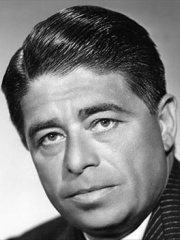
5. Alfred Newman (1900 - 1970)
With an HPI of 72.16, Alfred Newman is the 5th most famous American Composer. His biography has been translated into 38 different languages.
Alfred Newman (March 17, 1900 – February 17, 1970) was an American composer, arranger, and conductor of film music. From his start as a music prodigy, he came to be regarded as a respected figure in the history of film music. He won nine Academy Awards and was nominated 45 times, contributing to the extended Newman family being the most Academy Award-nominated family, with a collective 92 nominations in various music categories. In a career spanning more than four decades, Newman composed the scores for over 200 motion pictures. Some of his most famous scores include Wuthering Heights, The Hunchback of Notre Dame, The Mark of Zorro, How Green Was My Valley, The Song of Bernadette, Captain from Castile, All About Eve, Love Is a Many Splendored Thing, Anastasia, The Diary of Anne Frank, How the West Was Won, The Greatest Story Ever Told, and his final score, Airport, all of which were nominated for or won Academy Awards. He is perhaps best known for composing the fanfare which accompanies the studio logo at the beginning of 20th Century Fox's productions. Prior to commencing his employment with 20th Century Fox, Newman composed the fanfares which are most often associated with Samuel Goldwyn productions and David O. Selznick productions. Newman was also highly regarded as a conductor, and arranged and conducted many scores by other composers, including George Gershwin, Charlie Chaplin, and Irving Berlin. He also conducted the music for many film adaptations of Broadway musicals (having worked on Broadway for ten years before coming to Hollywood), as well as many original Hollywood musicals. He was among the first musicians to compose and conduct original music during Hollywood's Golden Age of movies, later becoming a respected and powerful music director in the history of Hollywood. Newman and two of his fellow composers, Max Steiner and Dimitri Tiomkin, were considered the "three godfathers of film music".

6. Philip Glass (b. 1937)
With an HPI of 70.46, Philip Glass is the 6th most famous American Composer. His biography has been translated into 58 different languages.
Philip Glass (born January 31, 1937) is an American composer and pianist. He is widely regarded as one of the most influential composers of the late 20th century. Glass's work has been associated with minimalism, being built up from repetitive phrases and shifting layers. He described himself as a composer of "music with repetitive structures", which he has helped to evolve stylistically. Glass founded the Philip Glass Ensemble in 1968. He has written 15 operas, numerous chamber operas and musical theatre works, 14 symphonies, 12 concertos, nine string quartets, various other chamber music pieces, and many film scores. He has received nominations for four Grammy Awards, including two for Best Contemporary Classical Composition for Satyagraha (1987) and String Quartet No. 2 (1988). He has received three Academy Award for Best Original Score nominations for Martin Scorsese's Kundun (1997), Stephen Daldry's The Hours (2002), and Richard Eyre's Notes on a Scandal (2006). He also composed the scores for Mishima: A Life in Four Chapters (1985), Hamburger Hill (1987), The Thin Blue Line (1988), Candyman (1992), The Truman Show (1998), and The Illusionist (2006). Glass is known for composing the operas Einstein on the Beach (1976), Satyagraha (1980), Akhnaten (1983), The Voyage (1992), and The Perfect American (2013). He also wrote the scores for Broadway productions such as the revivals of The Elephant Man (2002), The Crucible (2016), and King Lear (2019). For the latter he won the Drama Desk Award for Outstanding Music in a Play. Glass has received many accolades, including a BAFTA Award, a Drama Desk Award, and a Golden Globe Award, as well as nominations for three Academy Awards, four Grammy Awards, and a Primetime Emmy Award. He has also received the Ordre des Arts et des Lettres in 1995, the National Medal of Arts in 2010, the Kennedy Center Honors in 2018, and the Grammy Trustees Award in 2020. In 2025, he received a Lifetime Achievement from the World Soundtrack Academy.

7. Samuel Barber (1910 - 1981)
With an HPI of 69.97, Samuel Barber is the 7th most famous American Composer. His biography has been translated into 48 different languages.
Samuel Osmond Barber II (March 9, 1910 – January 23, 1981) was an American composer, pianist, conductor, baritone, and music educator, and one of the most celebrated composers of the mid-20th century. Principally influenced by nine years' composition studies with Rosario Scalero at the Curtis Institute and more than 25 years' study with his uncle, the composer Sidney Homer, Barber's music usually eschewed the experimental trends of musical modernism in favor of traditional 19th-century harmonic language and formal structure embracing lyricism and emotional expression. However, he adopted elements of modernism after 1940 in some of his compositions, such as an increased use of dissonance and chromaticism in the Cello Concerto (1945) and Medea's Dance of Vengeance (1955); and the use of tonal ambiguity and a narrow use of serialism in his Piano Sonata (1949), Prayers of Kierkegaard (1954), and Nocturne (1959). Barber was adept at both instrumental and vocal music. His works became successful on the international stage and many of his compositions enjoyed rapid adoption into the classical performance canon. In particular, his Adagio for Strings (1936) has earned a permanent place in the orchestral concert repertory, as has that work's adaptation for chorus, Agnus Dei (1967). He received the Pulitzer Prize for Music twice: for his opera Vanessa (1956–1957), and for the Concerto for Piano and Orchestra (1962). Also widely performed is his Knoxville: Summer of 1915 (1947), a setting for soprano and orchestra of a prose text by James Agee. At the time of Barber's death, nearly all of his compositions had been recorded. Many of his compositions were commissioned or first performed by such noted groups and artists as the Boston Symphony Orchestra, the Philadelphia Orchestra, the New York Philharmonic, the Metropolitan Opera, Vladimir Horowitz, Eleanor Steber, Raya Garbousova, John Browning, Leontyne Price, Pierre Bernac, Francis Poulenc, and Dietrich Fischer-Dieskau. While Barber composed a significant body of purely instrumental music, two-thirds of his compositional output were art songs for voice and piano, choral music, and songs for voice and orchestra. Some of his most frequently performed songs include both the solo voice and choral versions of Sure on this shining night (solo version from 1938 and choral version from 1961) with text by Agee, and the song cycle Hermit Songs (1953), with anonymous texts by Irish monks from the eighth through thirteenth centuries. This emphasis on sung material was rooted in his own brief career as a professional baritone in his 20s which inspired a lifelong love of vocal music. In 1935, Barber recorded his own setting of Arnold's "Dover Beach" for NBC, singing the vocal part accompanied by string quartet, and he was also featured weekly on NBC Radio in 1935–1936 performing German lieder and art songs. He also occasionally conducted performances and recordings of his works with symphony orchestras during the 1950s, and taught composition at the Curtis Institute from 1939 to 1942. Barber was in a relationship with the composer Gian Carlo Menotti for more than 40 years. They lived at Capricorn, a house just north of New York City, where they frequently hosted parties with academic and music luminaries. Menotti was Barber's librettist for two of his three operas. When the relationship ended in 1970, they remained close friends until Barber's death from cancer in 1981.

8. Henry Mancini (1924 - 1994)
With an HPI of 69.71, Henry Mancini is the 8th most famous American Composer. His biography has been translated into 57 different languages.
Henry Mancini ( man-SEE-nee; born Enrico Nicola Mancini; April 16, 1924 – June 14, 1994) was an American composer, conductor, arranger, pianist and flutist. Often cited as one of the greatest composers in the history of film, he won four Academy Awards, a Golden Globe, and twenty Grammy Awards, plus a posthumous Grammy Lifetime Achievement Award in 1995. His works include the theme and soundtrack for the Peter Gunn television series as well as the music for The Pink Panther film series ("The Pink Panther Theme") and "Moon River" from Breakfast at Tiffany's. The Music from Peter Gunn won the inaugural Grammy Award for Album of the Year. Mancini enjoyed a long collaboration in composing film scores for film director Blake Edwards. Mancini also scored a No. 1 hit single during the rock era on the Hot 100: his arrangement and recording of the "Love Theme from Romeo and Juliet" spent two weeks at the top, starting with the week ending June 28, 1969.

9. Scott Joplin (1868 - 1917)
With an HPI of 68.97, Scott Joplin is the 9th most famous American Composer. His biography has been translated into 59 different languages.
Scott Joplin (November 24, 1868 – April 1, 1917) was an American composer and pianist. Dubbed the "King of Ragtime", he composed more than 40 ragtime pieces, one ragtime ballet (original version of "The Ragtime Dance", 1899/1902), and two operas. One of his first and most popular pieces, the "Maple Leaf Rag", became the genre's first and most influential hit, later being recognized as the quintessential rag. Joplin considered ragtime to be a form of classical music meant to be played in concert halls and largely disdained the performance of ragtime as honky tonk music most common in saloons. Joplin grew up in a musical family of railway laborers in Texarkana, Texas. During the late 1880s, he traveled the American South as a musician. He went to Chicago for the World's Fair of 1893, which helped make ragtime a national craze by 1897. Joplin moved to Sedalia, Missouri, in 1894 and worked as a piano teacher. He began publishing music in 1895, and his "Maple Leaf Rag" in 1899 brought him fame and a steady income. In 1901, Joplin moved to St. Louis and two years later scored his first opera, A Guest of Honor. It was confiscated—along with his belongings—for non-payment of bills and is now considered lost. In 1907, Joplin moved to New York City to (unsuccessfully) find a producer for a new opera. In 1916, Joplin descended into dementia from neurosyphilis. His 1917 death marks the end of the ragtime era. Joplin's music was rediscovered and returned to popularity in the early 1970s with the release of a million-selling album recorded by Joshua Rifkin. This was followed by the Academy Award–winning 1973 film The Sting, which featured several of Joplin's compositions. Treemonisha, his second opera, was produced in 1972; and, in 1976, Joplin was awarded a Pulitzer Prize.
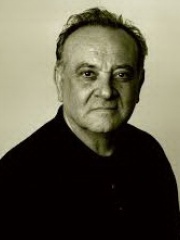
10. Angelo Badalamenti (1937 - 2022)
With an HPI of 68.92, Angelo Badalamenti is the 10th most famous American Composer. His biography has been translated into 39 different languages.
Angelo Daniel Badalamenti (March 22, 1937 – December 11, 2022) was an American composer and arranger best known for his film music, notably the scores for his collaborations with director David Lynch, Blue Velvet (1986), Twin Peaks (1990–1991; 2017), Twin Peaks: Fire Walk with Me (1992), The Straight Story (1999), and Mulholland Drive (2001). Badalamenti also composed scores for such films as National Lampoon's Christmas Vacation (1989), The City of Lost Children (1995), Holy Smoke! (1999), and A Very Long Engagement (2004), and recorded songs with artists including Julee Cruise (in collaboration with Lynch), Nina Simone, Shirley Bassey, Pet Shop Boys, Dusty Springfield, Marianne Faithfull, David Bowie, Tim Booth, Siouxsie Sioux and Dolores O'Riordan. In 1990, Badalamenti won the Grammy Award for Best Pop Instrumental Performance for his "Twin Peaks Theme" at the 33rd Annual Grammy Awards. He received a lifetime achievement award from the World Soundtrack Awards's Academy in 2008 and the Henry Mancini Award from the American Society of Composers, Authors and Publishers in 2011.
People
Pantheon has 155 people classified as American composers born between 2 and 1985. Of these 155, 54 (34.84%) of them are still alive today. The most famous living American composers include John Williams, Philip Glass, and Steve Reich. The most famous deceased American composers include George Gershwin, John Cage, and Leonard Bernstein. As of April 2024, 6 new American composers have been added to Pantheon including Trevor Dunn, Dustin O'Halloran, and Caroline Shaw.
Living American Composers
Go to all RankingsJohn Williams
1932 - Present
HPI: 75.77
Philip Glass
1937 - Present
HPI: 70.46
Steve Reich
1936 - Present
HPI: 67.92
Stephen Schwartz
1948 - Present
HPI: 67.30
Alan Silvestri
1950 - Present
HPI: 66.90
Danny Elfman
1953 - Present
HPI: 64.02
James Newton Howard
1951 - Present
HPI: 63.87
Bill Conti
1942 - Present
HPI: 63.69
Terry Riley
1935 - Present
HPI: 63.46
John Adams
1947 - Present
HPI: 63.39
Dave Grusin
1934 - Present
HPI: 60.75
Brian Tyler
1972 - Present
HPI: 60.47
Deceased American Composers
Go to all RankingsGeorge Gershwin
1898 - 1937
HPI: 77.09
John Cage
1912 - 1992
HPI: 75.55
Leonard Bernstein
1918 - 1990
HPI: 75.35
Alfred Newman
1900 - 1970
HPI: 72.16
Samuel Barber
1910 - 1981
HPI: 69.97
Henry Mancini
1924 - 1994
HPI: 69.71
Scott Joplin
1868 - 1917
HPI: 68.97
Angelo Badalamenti
1937 - 2022
HPI: 68.92
Jerry Goldsmith
1929 - 2004
HPI: 68.64
James Horner
1953 - 2015
HPI: 68.36
Charles Ives
1874 - 1954
HPI: 67.18
Aaron Copland
1900 - 1990
HPI: 66.86
Newly Added American Composers (2025)
Go to all RankingsTrevor Dunn
1968 - Present
HPI: 42.51
Dustin O'Halloran
1971 - Present
HPI: 40.36
Caroline Shaw
1982 - Present
HPI: 35.23
Rob Simonsen
1978 - Present
HPI: 33.77
Joseph Trapanese
1984 - Present
HPI: 31.78
Austin Wintory
1984 - Present
HPI: 30.78
Overlapping Lives
Which Composers were alive at the same time? This visualization shows the lifespans of the 25 most globally memorable Composers since 1700.

